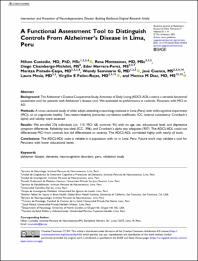A Functional Assessment Tool to Distinguish Controls From Alzheimer’s Disease in Lima, Peru

Ver/
Descargar
(application/pdf: 542.5Kb)
(application/pdf: 542.5Kb)
Fecha
2022Autor(es)
Custodio, Nilton
Montesinos, Rosa
Chambergo-Michilot, Diego
Herrera-Perez, Eder
Pintado-Caipa, Maritza
Seminario, Wendy
Cuenca, Jose
Mesía, Laura
Failoc-Rojas, Virgilio E
Diaz, Monica M
Metadatos
Mostrar el registro completo del ítemResumen
Background: The Alzheimer’s Disease Cooperative Study-Activities of Daily Living (ADCS-ADL) scale is a versatile functional assessment tool for patients with Alzheimer’s disease (AD). We evaluated its performance in controls, Peruvians with MCI or AD. Methods: A cross-sectional study of older adults attending a neurology institute in Lima (Peru) with mild cognitive impairment (MCI), AD or cognitively healthy. Test-retest reliability (intraclass correlation coefficient, ICC; internal consistency, Cronbach’s alpha) and validity were assessed. Results: We enrolled 276 individuals (AD: 113, MCI: 68, controls: 95) with no age, sex, educational level, and depressive symptom differences. Reliability was ideal (ICC: .996), and Cronbach’s alpha was adequate (.937). The ADCS-ADL could not differentiate MCI from controls but did differentiate AD severity. The ADCS-ADL correlated highly with nearly all tools. Conclusions: The ADCS-ADL scale is reliable in a population with AD in Lima, Peru. Future work may validate a tool for Peruvians with lower educational levels.
Colecciones
- Web of Science (WOS) [236]

